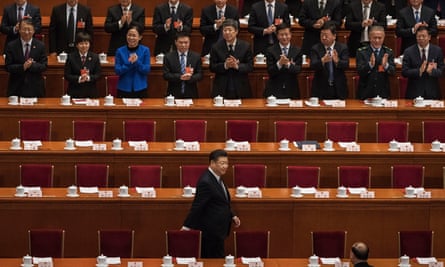China’s annual “two sessions” meetings begin on Saturday, with major reforms and government appointments expected, as well as the final formalisation of Xi Jinping’s precedent-busting third term as China’s leader.
What is the ‘two sessions’?
The event is called the “two sessions” because both the National People’s Congress (NPC) and the Chinese People’s Political Consultative Conference (CPPCC) hold their annual meetings separately, but at the same time. The CPPCC is an advisory body, and the 3,000-member NPC is the CCP’s legislative body, but is largely a “rubber stamping” parliament. Its members include business executives, celebrities, and celebrated individuals – state media on Monday reported one of the country’s first female fighter pilots had been made a delegate.
What will happen?
Thousands of delegates will descend on Beijing to ratify legislation, personnel changes and the government budget over about two weeks.
This is the first “two sessions” to be mostly unaffected by the pandemic, after zero-Covid restrictions were lifted in December. The 2020 session was delayed for several months, while the 2021 and 2022 meetings ran for just a week instead of the usual two. However reporters covering the event in Beijing this week have been ordered to quarantine in designated hotels from 8pm on Friday, showing that authorities still have some concern about the spread of the virus.
Xi is expected to open the first meeting with a speech on Saturday. It’s an important window into the policy direction of the Chinese government for the next year, albeit largely ceremonial. Senior party figures have already met at a party plenum to iron out and approve most of the details.
The“two sessions” is often when we also see major policy announcements. In 2021 Beijing extended its control over the once semi-autonomous city of Hong Kong, announcing a political overhaul to ensure it was run by “patriots only”, meaning Communist Party loyalists. In 2020 the “two sessions” pushed through the Hong Kong national security law, which became the lynchpin of the crackdown on opposition and dissent in the city.
And it was at the 2018 NPC that leadership term limits were abolished, paving the way for Xi to become leader for life.
Why is this year different?
This year’s “two sessions” is the first of the Chinese Communist party’s (CCP) new five-year term. In October the Party Congress saw Xi reappointed to the two most important of his three formal titles – general secretary of the CCP and chairman of the military commission. The third – which the Chinese government calls “president” of the People’s Republic of China in English – will be reaffirmed at this meeting.
It also saw a massive consolidation of power around the leader, with the purging of political rivals and elevation of loyalists. The “two sessions” is expected to keep this theme going, with anticipated reforms potentially further blurring the line between the party and the functions of government.
What can we expect?
A state media readout on Wednesday said the plenum had confirmed the list of proposed candidates for senior government appointments. The new premier and senior financial and central bank positions, are among expected announcements.
Wen-ti Sung, an expert on Chinese politics from the Australian National University, says it is also reasonable to expect something equally as significant as 2018 because it is once again the start of a new political cycle.
“This year’s NPC session, the first after leadership turnover [like in 2018], is expected to make significant constitutional revisions,” Sung said.
There’s speculation that the revisions might be the constitutional enshrinement of “the two establishes”, a party political term for new doctrines which cement Xi as the “core” of the CCP and his ideas as the party’s underpinning ideology.
The plenum readout also flagged major changes to the functions of government. According to the readout, Xi told those gathered of “a plan for deepening reform of Party and state institutions”. It didn’t give details, but similar reforms were made in 2018, notes Fordham Law school professor, Carl Minzner, author of End of an Era: How China’s Authoritarian Revival is Undermining Its Rise.
“Those involved a significant ‘re-Partyization’ of important parts of the Chinese bureaucracy, for example, by having the Party’s United Front Bureau swallow the state religion affairs and national ethnic affairs commissions,” he said.

Many analysts suspect the reforms to include further subsumption of government bureaus into CCP counterparts, with a likely focus on the finance sector and maybe even state security.
“Such a move would represent a significant escalation of Xi’s efforts to have party organs swallow state government ones, and risk dragging China back to a yet earlier era when political dictates - rather than technical expertise - governed the day-to-day operations of the economy and government,” Minzner said.
Government announcements this week have also hinted at greater party intervention on the legal sector, with new guidelines to have legal education more closely aligned with Xi ideology and less with western legal theories like the separation of powers.

 1 year ago
77
1 year ago
77










 English (US)
English (US)